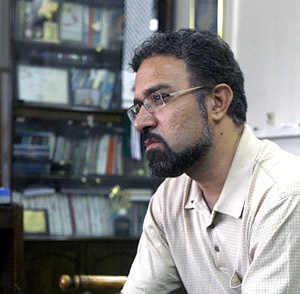Network of International Relations and Iran-U.S. Relations Negotiations

Grasping the complicated nature of international relations before considering talks with United States is a necessity. By Kiumars Ashtarian, professor of public policymaking in Tehran University:
Speaking of Iran-U.S. relations, we should not disregard the complicated nature of international relations and its network form. Hence, relations with every country should be studied within this framework. This network and the paradox of choice also exist in domestic affairs of countries, though solved in an authoritative fashion by the national state. Countries face intricate games and coalitions in the global arena however.
In our relations with the United States, four areas carry more weight: Taliban, Hamas, Iraq’s security, and Iran’s nuclear case. On Taliban, we face a network with five hubs, including Iran, United States, Arab states, Afghanistan and Pakistan. A specific network of relations is formed on this given issue. On the case of Taliban Iran and United States have roughly common interests (stability of Afghanistan and Pakistan governments), though having difference with Arab states. These can be showed with negatives and positives in a diagram of network relations. On Palestine and Hamas we have six hubs, namely Arab states, Israel, Iran, Turkey, Syria and the United States and on Iraq we have Iran, Iraq, the United States, Turkey and Arab states. It is much complicated on Iran’s nuclear case however: Europe, Russia, China, United States, Iran, Arab states and Israel.
Ira has to play 19 independent games within a network with twenty three hubs. This clearly shows the network model of international relations and the paradox of choice for each country. There may be a positive relation on a certain issue between two countries but that relation may be negative in another case.
My political deduction is that we can’t apply a wholesale approach to our relations with other countries. There are few countries which utterly accord in foreign relations. Even the best exemplars, United States and Israel, have differences.
The tenth administration: necessities and formalities
In this network atmosphere Iran’s next administration should focus on its international problems one by one and regulate its relations with other countries on that certain issue. And of course it should take this simple-to-understand but hard-to-apply point in mind that each problem is related to other ones. Tackling the problem of Taliban, Tehran will find itself in certain position to United States, Arab states, Afghanistan and Pakistan. But on Palestine and Hamas the relations change.
It is naïve to think that our problems with the United States will vanish in a flash. Even if we bury the axes, competitions and differences will still exist. Even a country such as Canada with its close relations with United States can not claim that it’s devoid of problems with its powerful neighbor.
Politicians and diplomats of the tenth administration:
Aversion is another factor we should take into consideration. It may be even more important than national interests. The tradition in political science is that countries seek national interests, but based on Kahneman and Tversky’s prospect theory, loss aversion is an influential parameter in foreign diplomacy which can shape behaviors. Psychological warfare and its related may seem overused tools which can only define the behaviors of the target party. But I believe they apply to analysis of the source. Loss aversion can clearly describe international relations and how some countries approach (or distance) other countries.
However, our next administration is in dire need of courage, one that moves it towards negotiations. This should be followed by a correct understanding of global conditions, wisdom and understanding of international formalities. Clarity is another crucial factor. Ambiguity is generally rejected and it causes fear. A closer look can show us how United States is taking advantage of our taste for ambiguity to fuel Iranophobia. A crude understanding perceives foreign policy as cunningness. This is not a valid perception when a great portion of foreign relations, especially in critical situations, can be handled through clarity. Cunningness should be used only to offset cunningness.
The nature of Iran-U.S. relations
For some, United States’ essence is the root of differences. However, I believe that quasi-philosophical explanations of the nature of American society are disputable, restrictive and paradoxical. Epistemological views of the issue just compound our problems. Cases like Iraq and Afghanistan in which we negotiated with United States show the shaky basis of such views. Indeed there are historical and ideological disputes between the two countries, and we shouldn’t relinquish our values but this doesn’t imply abstaining negotiations and following our national interests. The main bone of contention between us and Americans is Israel which can be solved through a delay mechanism that definitely serves our interests.
Interestingly, ideological differences have been beneficial for Iran and augmented our influence. That is what Arabs are concerned with. They believe that ideals have helped Iran to fulfill its national interests. While Arabs have befriended the United States to achieve their goals, Iran has opted hostility and so far it appears more successful, since it has appreciated the power of masses and regional culture.
Obama, change and United States
United States’ problems are amassing and the aftermath of its behaviors in the past decades have now turned change into an indisputable necessity. However, social changes do not necessarily lead to policy changes. It’s a matter of question that to what extent the political system in United States responds to these changes. However, we shouldn’t wait for genuine changes to start negotiations with this country, as we didn’t’ wait for change when we were negotiating on dealing with the problem of Taliban.

